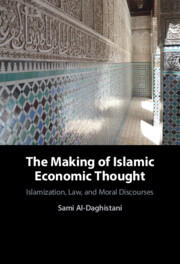Book contents
- The Making of Islamic Economic Thought
- The Making of Islamic Economic Thought
- Copyright page
- Contents
- Figures
- Acknowledgments
- Introduction
- 1 The Force of Revivalism and Islamization
- 2 The Present: Muslim Economists and the Constellation of Islamic Economics
- 3 The Past Perfect: Sharīʿa and the Intellectual History of Islamic Economic Teachings
- 4 The Appraisal: Contemporary Islamic Economics and the Entrenchment of Modernity
- 5 Pluralistic Epistemology of Islam’s Moral Economics
- Conclusion: Moral over Legal, Pluralistic over Monolithic
- Appendix
- Bibliography
- Index
Conclusion: Moral over Legal, Pluralistic over Monolithic
Published online by Cambridge University Press: 01 November 2021
- The Making of Islamic Economic Thought
- The Making of Islamic Economic Thought
- Copyright page
- Contents
- Figures
- Acknowledgments
- Introduction
- 1 The Force of Revivalism and Islamization
- 2 The Present: Muslim Economists and the Constellation of Islamic Economics
- 3 The Past Perfect: Sharīʿa and the Intellectual History of Islamic Economic Teachings
- 4 The Appraisal: Contemporary Islamic Economics and the Entrenchment of Modernity
- 5 Pluralistic Epistemology of Islam’s Moral Economics
- Conclusion: Moral over Legal, Pluralistic over Monolithic
- Appendix
- Bibliography
- Index
Summary
This book inquired into how Islamic economic thought emerged as a distinct field and what forces contributed to its development. The Muslim revivalists treated economics as part of their agenda in imagining an Islamic state and society. Only when Islamic economics became a constitutional force in the second half of the twentieth century, in that it asserted a particular religious identity, did it maintain a convincing foothold in the politico-economic landscape of Muslim-majority countries. Further, proponents of the Islamization process, such as Ismaʾil al-Faruqi, Nejatullah Siddiqi, Alam Choudhury, Umer Chapra, and others, considered Islamic economics as a tenacious discipline that was, however, conceived within the existing division of social sciences or as a result of Islamization efforts. I contend that such a development can be attributed to the structural changes that occurred in Muslim-majority countries at the turn of the century and to the consequent political variance of Muslim revivalists who contested, reacted to, and struggled with the colonial legacy by trying to create solutions to scientific, social, and constitutional setbacks. Nonetheless, this making of a discipline culminated in a particular, that is monolithic, explication of Islamic economic thought.
- Type
- Chapter
- Information
- The Making of Islamic Economic ThoughtIslamization, Law, and Moral Discourses, pp. 274 - 276Publisher: Cambridge University PressPrint publication year: 2022



